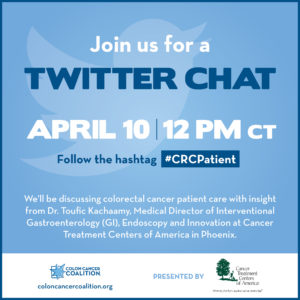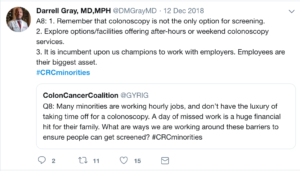A Twitter Chat is a running conversation on Twitter during a set time that revolves around a predetermined topic. The Twitter Chat can be found, followed, and contributed to by using a designated hashtag. For this Twitter Chat series presented by Cancer Treatment Centers of America on colorectal cancer patient cancer, it will be #CRCPatient
Why participate in a Twitter Chat?
Participating in a Twitter Chat lets you be part of an important conversation, and allows you to pull up a seat at the table next to survivors, providers, organizations, and institutions. It is your chance to have your voice heard and to make your experience and work matter. It is also a great way to connect with others in the shared space who have a vested interested in the cause.
How to participate in a Twitter Chat?
For one hour, anyone interested is welcome to be part of the discussion topic of the Twitter Chat. Every Twitter Chat has a topic, and the questions asked revolve around this. It’s easy to join by following and using a designated hashtag which will be promoted in advance and used with very question asked.
There are a set number of predetermined questions that will be presented in scheduled increments. In this Chat, each question will be preceded with “Q1” through “Q8,” and participants can retweet with an answer appropriately labeled “A1” through “A8.” The Colon Cancer Coalition will be asking the questions from their Twitter account (@gyrig) and everyone should retweet any question they want to answer with their response so their answer makes sense.
Feel free to attach any resources, links, or photos in your response that will help support your answer. Responding to the questions live during the Twitter Chat is not a requirement for participation. We hope others will join in the hours and days after the Chat, as the responses reverberate throughout Twitter.
For this chat on Wednesday, April 10, 2019, we’ll be discussing #CRCPatient care with Dr. Toufic Kachaamy, Medical Director of Interventional Gastroenterology (GI), Endoscopy and Innovation, with Cancer Treatment Centers of America in Phoenix.
Twitter Chat Questions:
Q1: Chemotherapy can have very negative side effects on the gut, leading to severe diarrhea and malnutrition for some. What are things patients can do to help keep their digestive tract balanced during treatment, and minimize or counter these side effects? #CRCPatient
Q2: Colorectal cancer patients can have digestive issues after surgery and radiation. One such issue is LARS, or lower anterior resection syndrome. How can a patient work with their GI to help manage this long term side effect and improve quality of life? #CRCPatient
Q3: Bowel prep instructions and methods vary, which leaves many patients wondering why their doctor would prescribe one over another. What is taken into account when giving a patient prep instructions, and are all preps universal for all patients? #CRCPatient
Q4: What can someone who doesn’t know or have access to their family history do to be proactive about screening and prevention? #CRCPatient
Q5: Research is showing that the gut biomes of colorectal cancer patients have similarities that defy location, lifestyle, and diet. Could the microbiome eventually factor in as a screening tool for preventing this disease? #CRCPatient
Q6: Colorectal cancer is an obesity-linked cancer, and a study was recently released connecting the rising obesity rates in the US with the rise in young onset CRC. What are a few simple yet effective ways for young people to control obesity and minimize their risk? #CRCPatient
Q7: For someone going in for a screening colonoscopy, what are some important questions or information the patient should consider discussing with their gastroenterologist before and after the procedure? #CRCPatient
Q8: What advice would you have for a person who feels their provider is not listening or investigating their concerns regarding digestive issues – many of which can be signs and symptoms of colorectal cancer? #CRCPatient



